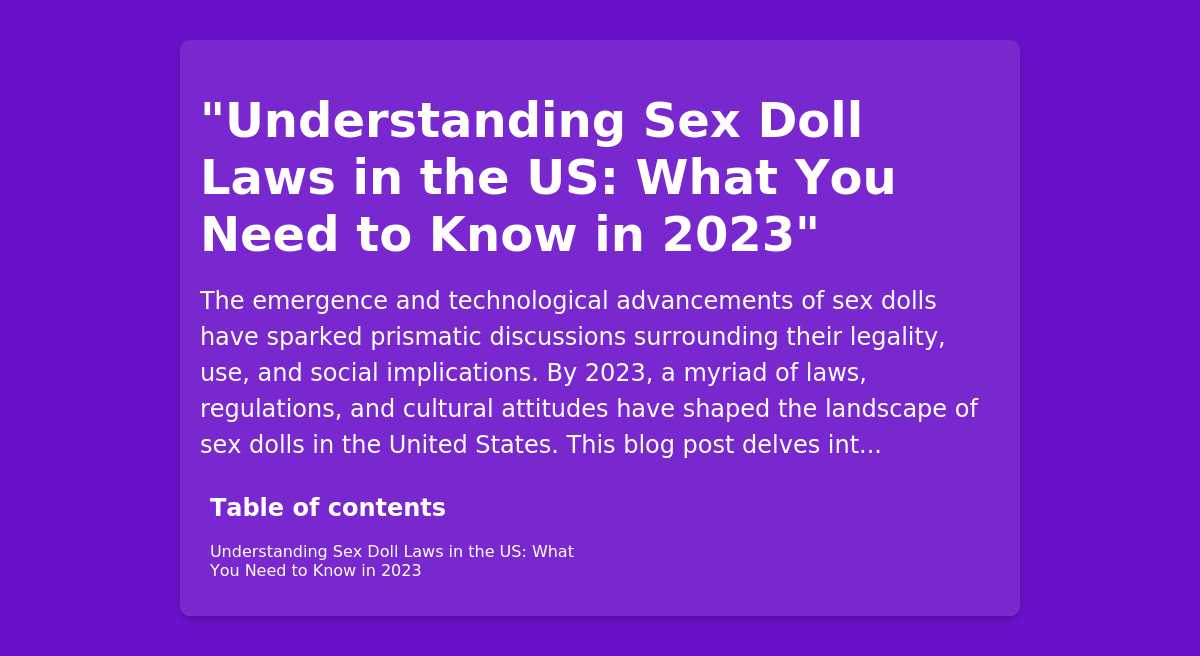Understanding Sex Doll Laws in the US: What You Need to Know
Understanding Sex Doll Laws in the US: What You Need to Know
In recent years, the topic of sex dolls has garnered attention, not just for their growing popularity but also concerning the legal landscape surrounding their use. This blog post will delve into the various laws and regulations concerning sex dolls in the United States, the ethical concerns associated with them, and what users need to keep in mind to comply with the law.
What Are Sex Dolls?
Sex dolls are life-sized replicas of human figures designed for sexual pleasure. They range from simple inflatable models to highly sophisticated, lifelike mannequins made of silicone or TPE (thermoplastic elastomer). The development of advanced robotics has also paved the way for AI-enabled sex dolls, which interact with users and can simulate conversation and companionship.
The Legal Landscape of Sex Dolls
Understanding sex doll laws in the U.S. can be complex due to the varying regulations across states and local jurisdictions. These laws typically encompass the following areas:
- Age Restrictions
- Obscenity Laws
- Health and Safety Regulations
- Importation Issues
- Prohibited Features and Materials
To illustrate this, let’s take a closer look at some of these aspects.
Age Restrictions
Minimum age requirements can affect both the sale and ownership of sex dolls. In most states, there are no specific laws prohibiting adults from purchasing sex dolls. However, restrictions may apply to dolls that resemble minors.
| State | Minors & Age Restrictions |
|---|---|
| California | No explicit laws against adult sex dolls; childlike dolls may be illegal. |
| New York | Similar to California; strict laws against dolls resembling children. |
| Texas | No specific laws, but concerns may arise with childlike dolls. |
Obscenity Laws
Federal and state obscenity laws may impact the legality of certain types of sex dolls. In general, materials that are considered obscene may be subject to seizure or prohibition. The Miller Test, established by the Supreme Court, provides a standard for determining whether something can be classified as obscene. It takes into account the work’s appeal to prurient interests, whether it depicts sexual conduct in an offensive way, and whether it lacks serious artistic, literary, political, or scientific value.
Health and Safety Regulations
Sex dolls fall under consumer product safety regulations. The U.S. Consumer Product Safety Commission (CPSC) ensures that products sold to consumers are safe. Depending on materials used in the manufacturing process, regulations surrounding chemicals and toxic substances may be applicable.
| Regulation | Description |
|---|---|
| CPSIA | The Consumer Product Safety Improvement Act restricts lead content and phthalates in toys and may apply to sex dolls. |
| FDA | Although sex dolls do not require FDA approval, manufacturers must comply with good manufacturing practices. |
Importation Issues
Importing sex dolls into the U.S. may face scrutiny from customs officials, especially if they depict minors or are considered obscene. Importers need to ensure that the dolls meet U.S. safety standards and do not violate any laws regarding obscenity or child likeness.
Prohibited Features and Materials
Certain features or materials in sex dolls are subject to legal restrictions. For example, some states may have laws against the sale of dolls that have childlike appearances—a point that raises significant moral and ethical concerns.
Ethical Concerns Surrounding Sex Dolls
While the legality of sex dolls is evolving, ethical considerations remain a key point of discussion. Some of these concerns include:
- Impact on Relationships: Critics argue that sex dolls may have an adverse effect on human relationships and intimacy.
- Objectification: There are fears that sex dolls promote unrealistic standards for physical appearance and sexual interactions.
- Potential for Misuse: The existence of childlike sex dolls could lead to unhealthy or harmful behaviors.
Regional Differences in Laws
One of the most significant challenges for those interested in owning a sex doll is navigating the local laws, which can be radically different from one jurisdiction to another.
| Region | Notable Law & Regulation |
|---|---|
| Northeast | Strict laws regarding childlike dolls in states like New Jersey and Massachusetts. |
| Midwest | States like Ohio have fewer restrictions; however, local ordinances may vary. |
| South | States such as Florida have some prohibitions against dolls representing minors. |
| West | California has the most liberal policies; however, local enforcement may vary. |
Consequences of Violating Sex Doll Laws
Owning a sex doll isn’t without risk. Violating local laws could lead to several consequences:
- Legal Penalties: Owners may face fines or other legal ramifications based on local and state laws.
- Seizure of Property: Customs officials can confiscate imported dolls deemed illegal or obscene.
- Reputation Damage: Engaging in activities deemed illegal can harm personal reputation or lead to social exclusion.
Recommendations for Potential Owners
If you’re considering purchasing or owning a sex doll, it’s crucial to do your research. Here are some recommendations:
- Know Your State Laws: Research the laws in your area and consult local regulations before purchasing a sex doll.
- Choose Guaranteed Retailers: Purchase from reputable vendors who comply with safety and legal requirements.
- Avoid Childlike Dolls: Given the legal landscape, it’s advisable to steer clear of dolls that could be interpreted as resembling minors.
The Role of the Internet and Social Media
The rise of the internet has made information more accessible but also complicated the landscape surrounding sex dolls. Online marketplaces and forums provide a wealth of information but can sometimes blur legal boundaries.
Conclusion
Understanding sex doll laws in the U.S. requires thorough research and an awareness of local and state regulations. While the topic remains controversial and evolving, potential owners must prioritize safety, legality, and ethics. By being informed, consumers can enjoy their personal endeavors responsibly while respecting the broader legal and societal context.
Frequently Asked Questions (FAQs)
Are sex dolls legal?
Yes, sex dolls are legal in the U.S., but laws vary significantly by state, especially concerning the appearance of the dolls.
What should I do if I’m unsure about my local laws?
Consult a legal expert familiar with local laws related to sex dolls or periodically check local government websites for updates.
Can I import a sex doll from another country?
It is possible to import sex dolls, but be aware of obscenity laws and regulations against items resembling minors.
Are there specific retailers known for compliance?
Research online forums and communities focused on adult products for recommendations on reputable retailers who adhere to legal standards.
Additional Resources
If you’re interested in gaining more insights into sex doll laws and the associated ethical concerns, consider reviewing the following resources:
- Local government websites
- Legal briefs on obscenity laws
- Community forums focused on adult products
- Educational websites discussing consumer product safety
By staying informed and proactive, you can navigate the complexities of sex doll ownership in the U.S. safely and responsibly.
Share with PDF: Download











Leave a Reply